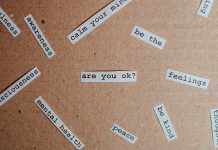I have always loved school and was never one to play hooky, so as a child if I ever told my mom that I didn’t feel well and wanted to stay home from school, she didn’t question it. Sometimes, I just needed a day at home to rest; other times, my insistence that I was not feeling well was the first sign of something bigger, like the flu. In high school, if my mom came home and found me passed out on my homework, she’d insist I take a “mental health day” before I made myself really sick.
As a result of my mom’s trust and observation, I learned to read my body’s health signals early on. I’ve rarely been very sick in my life because I’ve always responded quickly to whatever hints my body was giving me. If I was feeling a little run down, I’d prioritize rest and hydration, and that was usually enough to nip whatever was about to hit me in the bud. If rest and hydration didn’t work, I knew I was really sick and would head to the doctor. When sleeping my entire Thanksgiving break didn’t quell the overwhelming exhaustion I was feeling my senior year of college, I headed to the student health center. I had no other symptoms but was insistent that something just wasn’t right, so my doctor ran a bunch of tests and ended up diagnosing me with Mononucleosis. It was yet another confirmation that I understood my body’s language well, and that I could stay healthy if I just stayed in tune with whatever my body was telling me.

As an adult, I’ve only ever been really sick when I tried to push through the signs and let deadlines take priority over much-needed rest. I joke that I am the opposite of a hypochondriac, and if I find myself checking symptoms on Google, I’m not likely to convince myself I’m dying because I’m looking for the simplest, most reasonable explanation. In fact, thanks to my body intuition and well-developed teacher immune system, in January and February I spent four weeks nursing the other three members of my family through BOTH Flu A and Flu B and never got sick myself. I entered March feeling like my health was my superpower.
But that confidence quickly dissipated with the pandemic, and I’ve since struggled to trust my intuition about my personal health.
The first weekend of October, while everyone reveled in the “fall-like” temperatures, I found myself at home, nursing a migraine and sleeping away the weekend. This is par for the course for me. Fall weather means allergies (headache, congestion, wanting to scratch my eyes out), and they always show up conveniently right around the same time quarterly grades are due. I usually power through the week with the help of Zyrtec and Dayquil and then take a personal day as soon as grades are published. Any other year I would write these symptoms off as allergies. Any other year, I’d be confident that a little extra sleep was all I needed to feel better, but this year I was worried it could be COVID.
And it wasn’t just that weekend. Every sign of fatigue, every headache, has me questioning my symptoms. Every time I feel even slightly under the weather, I’m taking my temperature. If my kids are tired at an unusual time, if they cough once, if they say something tastes funny, I’m whipping out the thermometer and interrogating them about their symptoms.
It’s not just the fear that someone in my family will get COVID. The truth is, we are all very healthy and at relatively low risk of experiencing complications if we do get it. The problem is that we are at an increased risk of being exposed to and transmitting COVID. I am a teacher. My oldest attends school in person five days a week, and my youngest goes to daycare where children are encouraged but not required to wear masks.

I fear that if I am dismissive of a symptom, I will put someone else at risk.
If my headache was a COVID symptom and not the result of allergies, I could expose my students or my co-workers. My children could expose their teachers and their classmates. I worry that if I tell myself I am tired because I was up late grading, I might be ignoring the first signs of fatigue. I worry that if I tell myself my shoulders and neck are sore from spending hours at my computer, I am misidentifying body aches. I am even a little afraid that, if I take the Zyrtec and Dayquil to get me through the day, I’ll unknowingly mask another tell-tale symptom.
It doesn’t help that, as a teacher, this year is more exhausting than ever. I feel like if I don’t push myself and power through, I’ll fall so behind I’ll never catch up. If I don’t try to stay on top of grading, then I can’t tell who isn’t doing their work or who is struggling to understand. If I focus on grading, then I’m scrambling to get together quality virtual lesson plans. If I spend too much time on virtual lessons, then I’m not ready to teach my students who are attending in person. All the while, I know that working myself to exhaustion is ignoring my body’s cry for rest, that ignoring my body’s signals will certainly lower my immunity, and that a lowered immunity is an open invitation to getting COVID.
And so I circle right back to my fear that I will get sick or that I will be responsible for getting someone else sick. I live in a constant state of paranoia that my body will betray me, when the truth is, these COVID-anxieties have betrayed my body. My body has always communicated so clearly to me, but right now, I’m just too overwhelmed to listen.
















